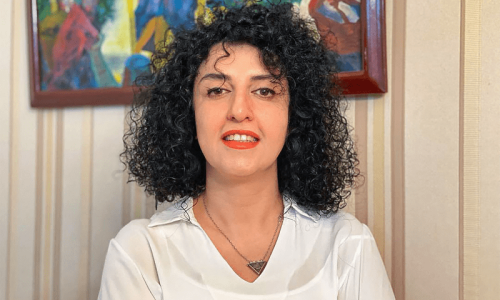 LONDON: Toni Morrison has become a figurehead for repressed minorities and underdogs. All the same, it must have been odd for her, in the light of the recent Nobel commotion, to find herself recast in the usual role by virtue of neither her race nor her gender, but her nationality. Now, in addition to being the first African American to win the Nobel Prize for Literature, she stands as the last American in 15 years – perhaps the last ever – if the Nobel Prize committee’s Horace Engdahl were to have his way.
LONDON: Toni Morrison has become a figurehead for repressed minorities and underdogs. All the same, it must have been odd for her, in the light of the recent Nobel commotion, to find herself recast in the usual role by virtue of neither her race nor her gender, but her nationality. Now, in addition to being the first African American to win the Nobel Prize for Literature, she stands as the last American in 15 years – perhaps the last ever – if the Nobel Prize committee’s Horace Engdahl were to have his way.
Toni Morrison attracts an intensity of adulation more commonly reserved for children’s authors. Her fans flock to her readings in their thousands. They have included real red carpet celebrities as well as literary celebrities – Marlon Brando and Hillary Clinton along with Margaret Atwood and A.S. Byatt.
They have made every novel since her third, published three decades ago, into a bestseller and ensured that first edition copies of her debut fetch in excess of $10,000. Message boards are abuzz with the advance word on her forthcoming novel, A Mercy, her first in five years. She is, according to the New York Times, ‘the nearest thing America has to a national novelist’.
When she wrote to Barack Obama this year, her letter seemed to transcend routine politicking, even after the campaign made her words public. ‘This opportunity for a national evolution [even revolution] will not come again soon and I am convinced you are the person to capture it,’ she told him, wrapping up with the words: ‘You are the man for this time. Good luck to you and to us.’
The granddaughter of sharecroppers and the second of four children, she was born Chloe Ardelia Wofford on 18 February, 1931. Her parents had left the south in search of better prospects, settling in Lorain, Ohio, 40km west of Cleveland and close to Lake Erie. Today, it forms part of the Rust Belt, but back then her father worked as a welder for US Steel and always held down at least a couple of other jobs after hours. Her mother was a member of the African Methodist Episcopal Church, where she sang in the choir. As well as songs, she shared ghost stories – spine-tinglers learnt from older relatives in Alabama – with her bookish daughter, who was already reading Austen and Tolstoy.
At 12, Morrison converted to Catholicism and took Anthony for her middle name, which friends shortened to Toni when she got to college – Howard, the all-black university in Washington. Strangely, it was there that she got her first real taste of racism. Her father had been profoundly suspicious of white people and, growing up in the Wofford household, the dark shadows had all been white.Nevertheless, social stratification in Lorain was more about class and wealth and her schooling had been mixed. In Washington, buses were still segregated and the system was replicated even on campus, where the so-called ‘paper bag test’ was enforced: if your skin was darker than the bag, you were put in one category, paler, into another.
Spotlight on African fiction
In 1953, she went on to study for her masters at Cornell, writing her thesis on ‘the alienated’ in works by Virginia Woolf and William Faulkner, whom she is now frequently cited alongside. At around the same time, she met and married a Jamaican-born architect named Harold Morrison. She also joined a writing group and began a story based on something another black girl had once told her, that she had prayed and prayed to be given blue eyes.
Like so many writers, elements of Morrison’s early life blur with her early fiction. That story eventually became her first novel, The Bluest Eye, which is set in downtown Lorain during the Depression. Critic John Leonard, one of her earliest admirers, praised the novel for being at once ‘history, sociology, folklore, nightmare and music’.
It was published in 1970 when she was living in New York, working as an editor for Random House. She’d taken the job after her marriage collapsed and she needed to support her two sons, then aged three and three months. In all, she would spend 19 years as an editor. An academic career would follow, culminating in a chair at Harvard, yet her work as an editor is equally significant.
She anthologised African authors such as Chinua Achebe and Wole Soyinka and championed the fiction of African Americans Toni Cade Bambara and Angela Davis and others, helping to bring it into the mainstream. She published Mohammad Ali’s autobiography and compiled a groundbreaking work of black history, The Black Book.
Her second novel, Sula, spanning 1919 to 1965, was again set in Ohio. She followed it with the epic Song of Solomon, the first in a succession of historical novels that would see her dramatise everything from the great migration to the Harlem Renaissance. The novel beat books by Joan Didion and John Cheever to scoop the 1977 National Book Critics Circle Award.
Subsequent novels have won her a string of firsts – the first black author to have a book chosen by the Book of the Month Club in more than 30 years, the first black woman to grace the cover of Newsweek magazine in almost 40 and, of course, the first black American woman to win a Nobel Prize for Literature ever.
New Yorker writer Hilton Als described the moment that for him sums up her arrival as a literary megastar. ‘I recall walking along the West Side piers in Manhattan and hearing a Puerto Rican queen, defending one of her “children”, say to an opponent, “You want me to go Beloved on your ass?”’
Published in 1987, the Pulitzer-winning Beloved is based on the true case of Margaret Garner, a runaway slave who killed her daughter rather than have her recaptured, and was then tried for theft of her master’s property rather than murder. Though Morrison has since written more novels, essays, song cycles, children’s books, a play and an opera, it remains her best-known work.
Her new novel, A Mercy, is a ‘prelude’ to Beloved. Set in 17th-century America, its central character, Florens, is a Morrison heroine through and through, a slave girl forced upon a trader in lieu of a debt. Yet elsewhere the story is much more complicated. This is just before sugar took off as a commodity, just before the demand for human labour made the slave trade into the monstrous machine that it became by the time Beloved begins. Hardship is everywhere and religious prejudice is as virulent as racism. Most of novel’s characters are victims and all are trying to make something of themselves.
When Morrison won her Nobel, she wrote: ‘I felt representative. I felt American. I felt Ohioan. I felt blacker than ever. I felt more woman than ever.’—Dawn/Guardian News Service














































Dear visitor, the comments section is undergoing an overhaul and will return soon.